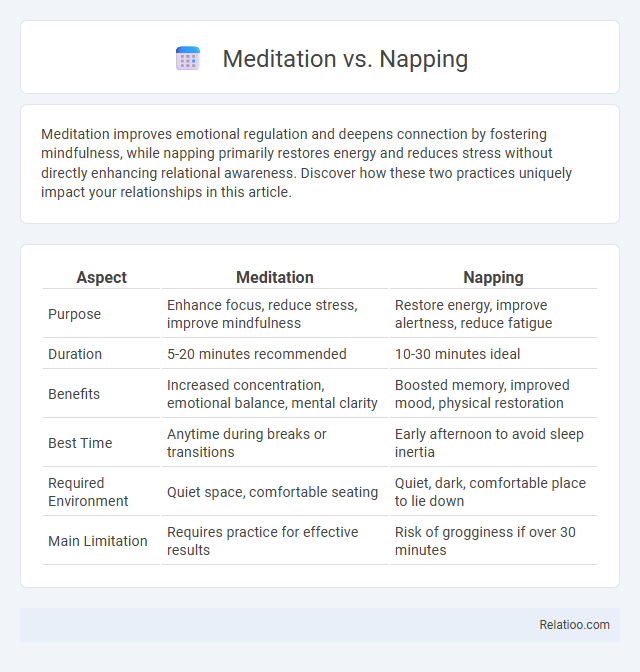Meditation improves emotional regulation and deepens connection by fostering mindfulness, while napping primarily restores energy and reduces stress without directly enhancing relational awareness. Discover how these two practices uniquely impact your relationships in this article.
Table of Comparison
| Aspect | Meditation | Napping |
|---|---|---|
| Purpose | Enhance focus, reduce stress, improve mindfulness | Restore energy, improve alertness, reduce fatigue |
| Duration | 5-20 minutes recommended | 10-30 minutes ideal |
| Benefits | Increased concentration, emotional balance, mental clarity | Boosted memory, improved mood, physical restoration |
| Best Time | Anytime during breaks or transitions | Early afternoon to avoid sleep inertia |
| Required Environment | Quiet space, comfortable seating | Quiet, dark, comfortable place to lie down |
| Main Limitation | Requires practice for effective results | Risk of grogginess if over 30 minutes |
Introduction to Meditation and Napping
Meditation enhances mental clarity and reduces stress by promoting mindfulness and deep relaxation, while napping provides a quick physical and cognitive energy boost by allowing the body to briefly rest. Your choice between meditation and napping depends on whether you seek sustained focus and emotional balance or immediate recovery from fatigue. Understanding these practices helps optimize daily performance and overall well-being.
Defining Meditation: Techniques and Practices
Meditation involves focused attention and mindfulness techniques such as breath awareness, guided visualization, and mantra repetition to calm the mind and improve mental clarity. Unlike napping, which provides short-term physical rest, meditation aims to rejuvenate both body and mind by enhancing emotional regulation and reducing stress. Your practice of meditation can lead to sustained mental well-being by fostering deep relaxation and heightened self-awareness.
What is Napping? Types and Benefits
Napping is a short period of sleep taken during the day to restore alertness and enhance cognitive performance. Common types include power naps (10-20 minutes), which improve focus without causing grogginess, and longer naps (60-90 minutes) that facilitate memory consolidation and creativity. Benefits of napping encompass reduced fatigue, improved mood, increased productivity, and lowered risk of heart disease, making it a vital tool for mental and physical rejuvenation.
Mental Health Benefits: Meditation vs Napping
Meditation enhances your mental health by reducing stress, improving focus, and promoting emotional balance through mindfulness and deep breathing techniques. Napping offers short-term cognitive benefits like improved memory retention and alertness but may disrupt sleep patterns if excessive. Rejuvenation practices combine elements of relaxation and restorative rest, supporting overall brain function and mental clarity more holistically than meditation or napping alone.
Physical Health Impacts: Comparing Both Practices
Meditation enhances physical health by reducing stress hormones, improving cardiovascular function, and lowering blood pressure, which supports long-term heart health. Napping provides immediate physical restoration, decreasing fatigue, boosting immune function, and improving alertness, especially when limited to 20-30 minutes to avoid sleep inertia. Rejuvenation practices combining meditation and napping optimize recovery by balancing mental relaxation and physical restoration, leading to improved energy levels and overall well-being.
Stress Reduction: Which Is More Effective?
Meditation, napping, and rejuvenation techniques each offer distinct benefits for stress reduction, with meditation providing deep mental relaxation through mindfulness and breath control, effectively lowering cortisol levels. Napping can quickly alleviate fatigue and improve cognitive function, but short naps (10-20 minutes) are more effective for stress relief without causing grogginess. Your choice depends on your immediate needs: meditation cultivates long-term resilience to stress, napping offers fast mental refreshment, and other rejuvenation methods like gentle exercise or nature walks enhance overall well-being and stress management.
Cognitive Performance: Meditation or Nap for Focus
Meditation enhances cognitive performance by improving attention control, reducing stress, and boosting mental clarity through mindfulness practices. Napping replenishes cognitive resources by decreasing sleep pressure, leading to improved alertness and memory consolidation in a short time. Your choice between meditation or napping for focus depends on whether you need sustained mental clarity or immediate energy restoration.
Sleep Quality: Does Meditation or Napping Help More?
Meditation improves sleep quality by reducing stress and promoting relaxation, making it an effective tool for enhancing your overall rest cycle. Napping can provide short-term energy boosts but may disrupt nighttime sleep patterns if taken too late or too long. Optimizing sleep quality often involves balancing meditation practices with strategic napping to rejuvenate without compromising your nightly sleep.
When to Choose Meditation Over Napping
Choose meditation over napping when seeking increased mental clarity, stress reduction, and prolonged alertness without grogginess. Meditation enhances focus and emotional resilience through mindfulness, making it ideal during work breaks or periods requiring sustained cognitive performance. In contrast, napping best suits situations of acute fatigue needing quick physical rest but may cause sleep inertia if poorly timed.
Conclusion: Which Practice Suits Your Lifestyle?
Meditation enhances mental clarity and reduces stress through focused mindfulness, making it ideal for those seeking long-term cognitive benefits. Napping provides immediate energy restoration and improved alertness, suitable for individuals with short breaks or inconsistent sleep patterns. Rejuvenation combining physical rest and mental relaxation offers a balanced approach, fitting lifestyles that require holistic recovery and sustained well-being.

Infographic: Meditation vs Napping
 relatioo.com
relatioo.com